Schizophrenia Case Study: Psychiatric History and Treatment Approaches
VerifiedAdded on 2023/06/04
|10
|2510
|487
Case Study
AI Summary
This case study examines a 21-year-old university student, Andy, diagnosed with schizophrenia. Referred by his family doctor, Andy exhibits symptoms including hallucinations (hearing voices) and delusions (believing a chip monitors him). The study includes a psychiatric history, mental state examination (appearance, behavior, mood, thought processes, insight, and judgment), and risk assessment, leading to a diagnosis of schizophrenia. The study suggests medical interventions like Risperidone, Olanzapine, and Clozapine, alongside psychosocial interventions such as social skills training, family psycho-education, and cognitive therapy. Nursing interventions emphasize building trust, clear communication, and creating a safe environment. The case concludes that a combination of medication, therapy, and supportive care is essential for managing schizophrenia. Desklib provides a platform to explore more solved assignments and resources for students.

Running head: SCHIZOPHRENIA 1
Schizophrenia
Student’s Name
Institutional Affiliation
Schizophrenia
Student’s Name
Institutional Affiliation
Paraphrase This Document
Need a fresh take? Get an instant paraphrase of this document with our AI Paraphraser
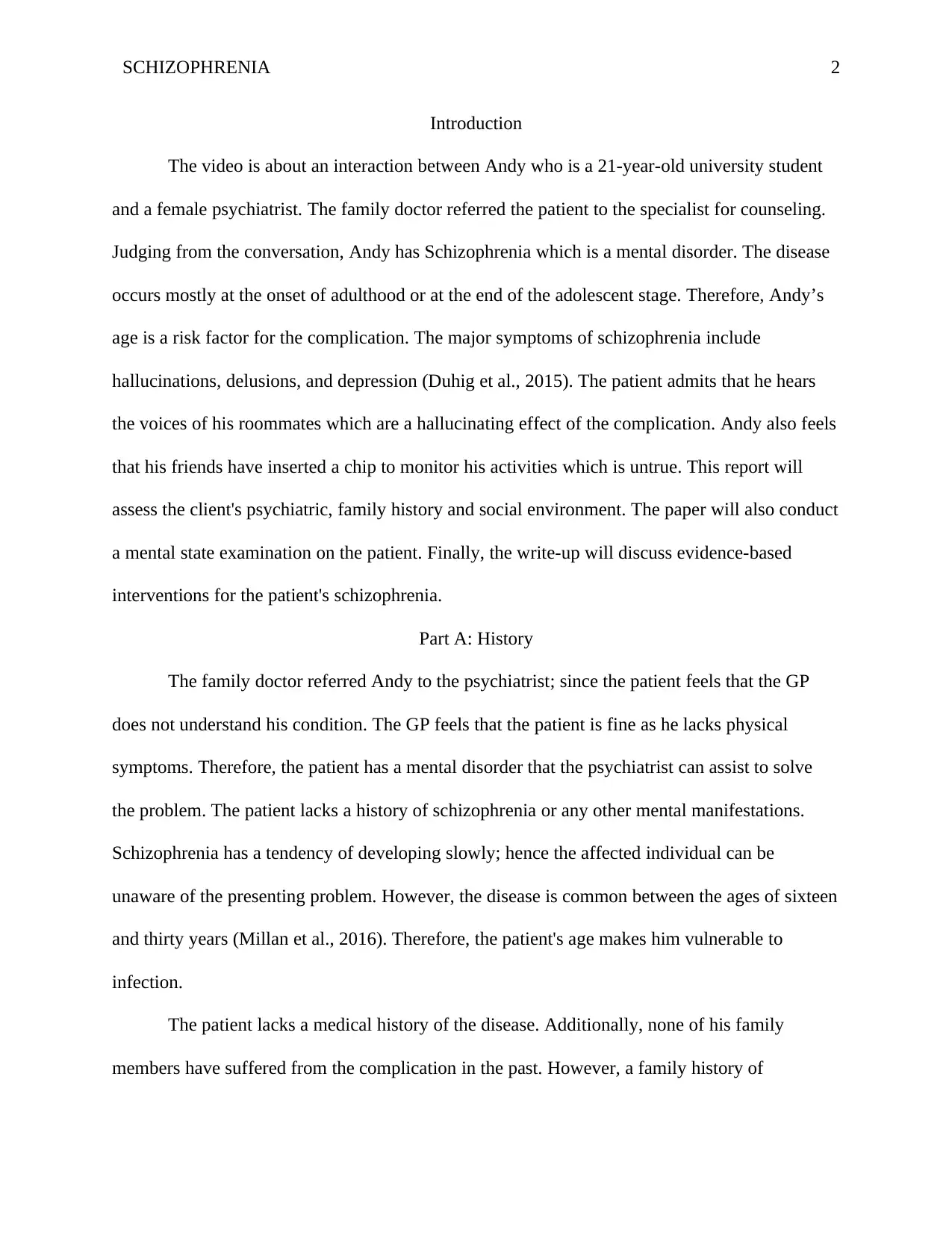
SCHIZOPHRENIA 2
Introduction
The video is about an interaction between Andy who is a 21-year-old university student
and a female psychiatrist. The family doctor referred the patient to the specialist for counseling.
Judging from the conversation, Andy has Schizophrenia which is a mental disorder. The disease
occurs mostly at the onset of adulthood or at the end of the adolescent stage. Therefore, Andy’s
age is a risk factor for the complication. The major symptoms of schizophrenia include
hallucinations, delusions, and depression (Duhig et al., 2015). The patient admits that he hears
the voices of his roommates which are a hallucinating effect of the complication. Andy also feels
that his friends have inserted a chip to monitor his activities which is untrue. This report will
assess the client's psychiatric, family history and social environment. The paper will also conduct
a mental state examination on the patient. Finally, the write-up will discuss evidence-based
interventions for the patient's schizophrenia.
Part A: History
The family doctor referred Andy to the psychiatrist; since the patient feels that the GP
does not understand his condition. The GP feels that the patient is fine as he lacks physical
symptoms. Therefore, the patient has a mental disorder that the psychiatrist can assist to solve
the problem. The patient lacks a history of schizophrenia or any other mental manifestations.
Schizophrenia has a tendency of developing slowly; hence the affected individual can be
unaware of the presenting problem. However, the disease is common between the ages of sixteen
and thirty years (Millan et al., 2016). Therefore, the patient's age makes him vulnerable to
infection.
The patient lacks a medical history of the disease. Additionally, none of his family
members have suffered from the complication in the past. However, a family history of
Introduction
The video is about an interaction between Andy who is a 21-year-old university student
and a female psychiatrist. The family doctor referred the patient to the specialist for counseling.
Judging from the conversation, Andy has Schizophrenia which is a mental disorder. The disease
occurs mostly at the onset of adulthood or at the end of the adolescent stage. Therefore, Andy’s
age is a risk factor for the complication. The major symptoms of schizophrenia include
hallucinations, delusions, and depression (Duhig et al., 2015). The patient admits that he hears
the voices of his roommates which are a hallucinating effect of the complication. Andy also feels
that his friends have inserted a chip to monitor his activities which is untrue. This report will
assess the client's psychiatric, family history and social environment. The paper will also conduct
a mental state examination on the patient. Finally, the write-up will discuss evidence-based
interventions for the patient's schizophrenia.
Part A: History
The family doctor referred Andy to the psychiatrist; since the patient feels that the GP
does not understand his condition. The GP feels that the patient is fine as he lacks physical
symptoms. Therefore, the patient has a mental disorder that the psychiatrist can assist to solve
the problem. The patient lacks a history of schizophrenia or any other mental manifestations.
Schizophrenia has a tendency of developing slowly; hence the affected individual can be
unaware of the presenting problem. However, the disease is common between the ages of sixteen
and thirty years (Millan et al., 2016). Therefore, the patient's age makes him vulnerable to
infection.
The patient lacks a medical history of the disease. Additionally, none of his family
members have suffered from the complication in the past. However, a family history of
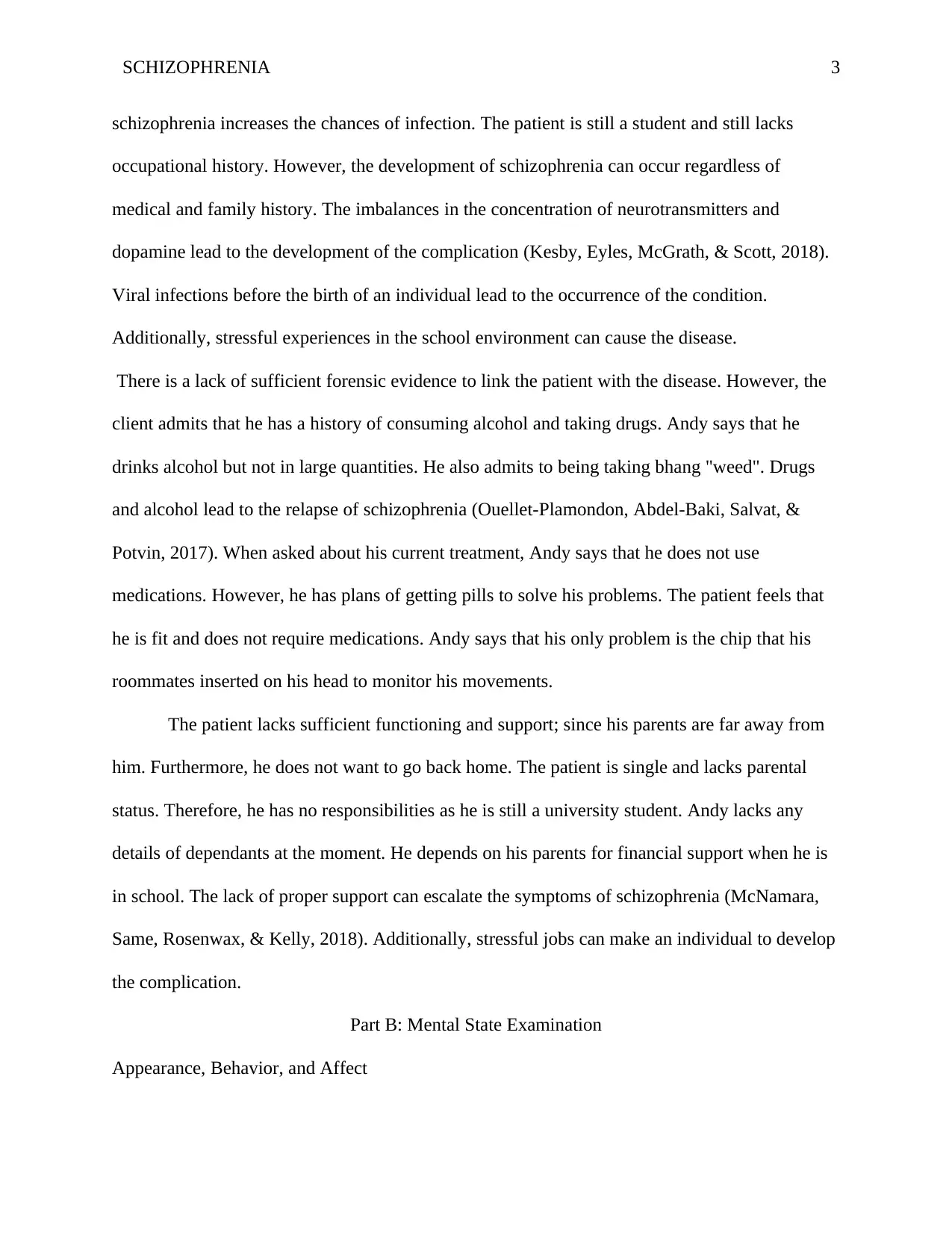
SCHIZOPHRENIA 3
schizophrenia increases the chances of infection. The patient is still a student and still lacks
occupational history. However, the development of schizophrenia can occur regardless of
medical and family history. The imbalances in the concentration of neurotransmitters and
dopamine lead to the development of the complication (Kesby, Eyles, McGrath, & Scott, 2018).
Viral infections before the birth of an individual lead to the occurrence of the condition.
Additionally, stressful experiences in the school environment can cause the disease.
There is a lack of sufficient forensic evidence to link the patient with the disease. However, the
client admits that he has a history of consuming alcohol and taking drugs. Andy says that he
drinks alcohol but not in large quantities. He also admits to being taking bhang "weed". Drugs
and alcohol lead to the relapse of schizophrenia (Ouellet-Plamondon, Abdel-Baki, Salvat, &
Potvin, 2017). When asked about his current treatment, Andy says that he does not use
medications. However, he has plans of getting pills to solve his problems. The patient feels that
he is fit and does not require medications. Andy says that his only problem is the chip that his
roommates inserted on his head to monitor his movements.
The patient lacks sufficient functioning and support; since his parents are far away from
him. Furthermore, he does not want to go back home. The patient is single and lacks parental
status. Therefore, he has no responsibilities as he is still a university student. Andy lacks any
details of dependants at the moment. He depends on his parents for financial support when he is
in school. The lack of proper support can escalate the symptoms of schizophrenia (McNamara,
Same, Rosenwax, & Kelly, 2018). Additionally, stressful jobs can make an individual to develop
the complication.
Part B: Mental State Examination
Appearance, Behavior, and Affect
schizophrenia increases the chances of infection. The patient is still a student and still lacks
occupational history. However, the development of schizophrenia can occur regardless of
medical and family history. The imbalances in the concentration of neurotransmitters and
dopamine lead to the development of the complication (Kesby, Eyles, McGrath, & Scott, 2018).
Viral infections before the birth of an individual lead to the occurrence of the condition.
Additionally, stressful experiences in the school environment can cause the disease.
There is a lack of sufficient forensic evidence to link the patient with the disease. However, the
client admits that he has a history of consuming alcohol and taking drugs. Andy says that he
drinks alcohol but not in large quantities. He also admits to being taking bhang "weed". Drugs
and alcohol lead to the relapse of schizophrenia (Ouellet-Plamondon, Abdel-Baki, Salvat, &
Potvin, 2017). When asked about his current treatment, Andy says that he does not use
medications. However, he has plans of getting pills to solve his problems. The patient feels that
he is fit and does not require medications. Andy says that his only problem is the chip that his
roommates inserted on his head to monitor his movements.
The patient lacks sufficient functioning and support; since his parents are far away from
him. Furthermore, he does not want to go back home. The patient is single and lacks parental
status. Therefore, he has no responsibilities as he is still a university student. Andy lacks any
details of dependants at the moment. He depends on his parents for financial support when he is
in school. The lack of proper support can escalate the symptoms of schizophrenia (McNamara,
Same, Rosenwax, & Kelly, 2018). Additionally, stressful jobs can make an individual to develop
the complication.
Part B: Mental State Examination
Appearance, Behavior, and Affect
⊘ This is a preview!⊘
Do you want full access?
Subscribe today to unlock all pages.

Trusted by 1+ million students worldwide
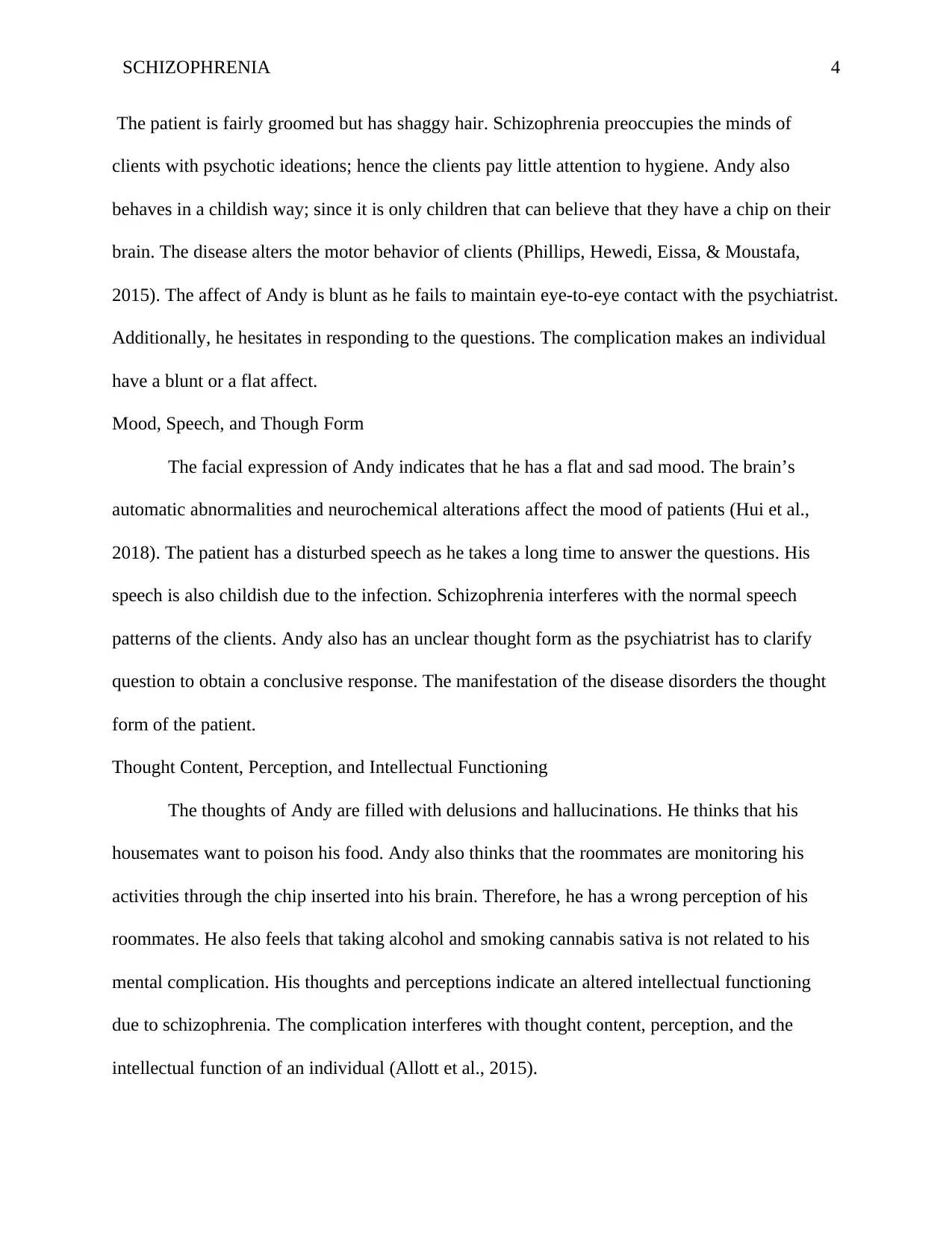
SCHIZOPHRENIA 4
The patient is fairly groomed but has shaggy hair. Schizophrenia preoccupies the minds of
clients with psychotic ideations; hence the clients pay little attention to hygiene. Andy also
behaves in a childish way; since it is only children that can believe that they have a chip on their
brain. The disease alters the motor behavior of clients (Phillips, Hewedi, Eissa, & Moustafa,
2015). The affect of Andy is blunt as he fails to maintain eye-to-eye contact with the psychiatrist.
Additionally, he hesitates in responding to the questions. The complication makes an individual
have a blunt or a flat affect.
Mood, Speech, and Though Form
The facial expression of Andy indicates that he has a flat and sad mood. The brain’s
automatic abnormalities and neurochemical alterations affect the mood of patients (Hui et al.,
2018). The patient has a disturbed speech as he takes a long time to answer the questions. His
speech is also childish due to the infection. Schizophrenia interferes with the normal speech
patterns of the clients. Andy also has an unclear thought form as the psychiatrist has to clarify
question to obtain a conclusive response. The manifestation of the disease disorders the thought
form of the patient.
Thought Content, Perception, and Intellectual Functioning
The thoughts of Andy are filled with delusions and hallucinations. He thinks that his
housemates want to poison his food. Andy also thinks that the roommates are monitoring his
activities through the chip inserted into his brain. Therefore, he has a wrong perception of his
roommates. He also feels that taking alcohol and smoking cannabis sativa is not related to his
mental complication. His thoughts and perceptions indicate an altered intellectual functioning
due to schizophrenia. The complication interferes with thought content, perception, and the
intellectual function of an individual (Allott et al., 2015).
The patient is fairly groomed but has shaggy hair. Schizophrenia preoccupies the minds of
clients with psychotic ideations; hence the clients pay little attention to hygiene. Andy also
behaves in a childish way; since it is only children that can believe that they have a chip on their
brain. The disease alters the motor behavior of clients (Phillips, Hewedi, Eissa, & Moustafa,
2015). The affect of Andy is blunt as he fails to maintain eye-to-eye contact with the psychiatrist.
Additionally, he hesitates in responding to the questions. The complication makes an individual
have a blunt or a flat affect.
Mood, Speech, and Though Form
The facial expression of Andy indicates that he has a flat and sad mood. The brain’s
automatic abnormalities and neurochemical alterations affect the mood of patients (Hui et al.,
2018). The patient has a disturbed speech as he takes a long time to answer the questions. His
speech is also childish due to the infection. Schizophrenia interferes with the normal speech
patterns of the clients. Andy also has an unclear thought form as the psychiatrist has to clarify
question to obtain a conclusive response. The manifestation of the disease disorders the thought
form of the patient.
Thought Content, Perception, and Intellectual Functioning
The thoughts of Andy are filled with delusions and hallucinations. He thinks that his
housemates want to poison his food. Andy also thinks that the roommates are monitoring his
activities through the chip inserted into his brain. Therefore, he has a wrong perception of his
roommates. He also feels that taking alcohol and smoking cannabis sativa is not related to his
mental complication. His thoughts and perceptions indicate an altered intellectual functioning
due to schizophrenia. The complication interferes with thought content, perception, and the
intellectual function of an individual (Allott et al., 2015).
Paraphrase This Document
Need a fresh take? Get an instant paraphrase of this document with our AI Paraphraser
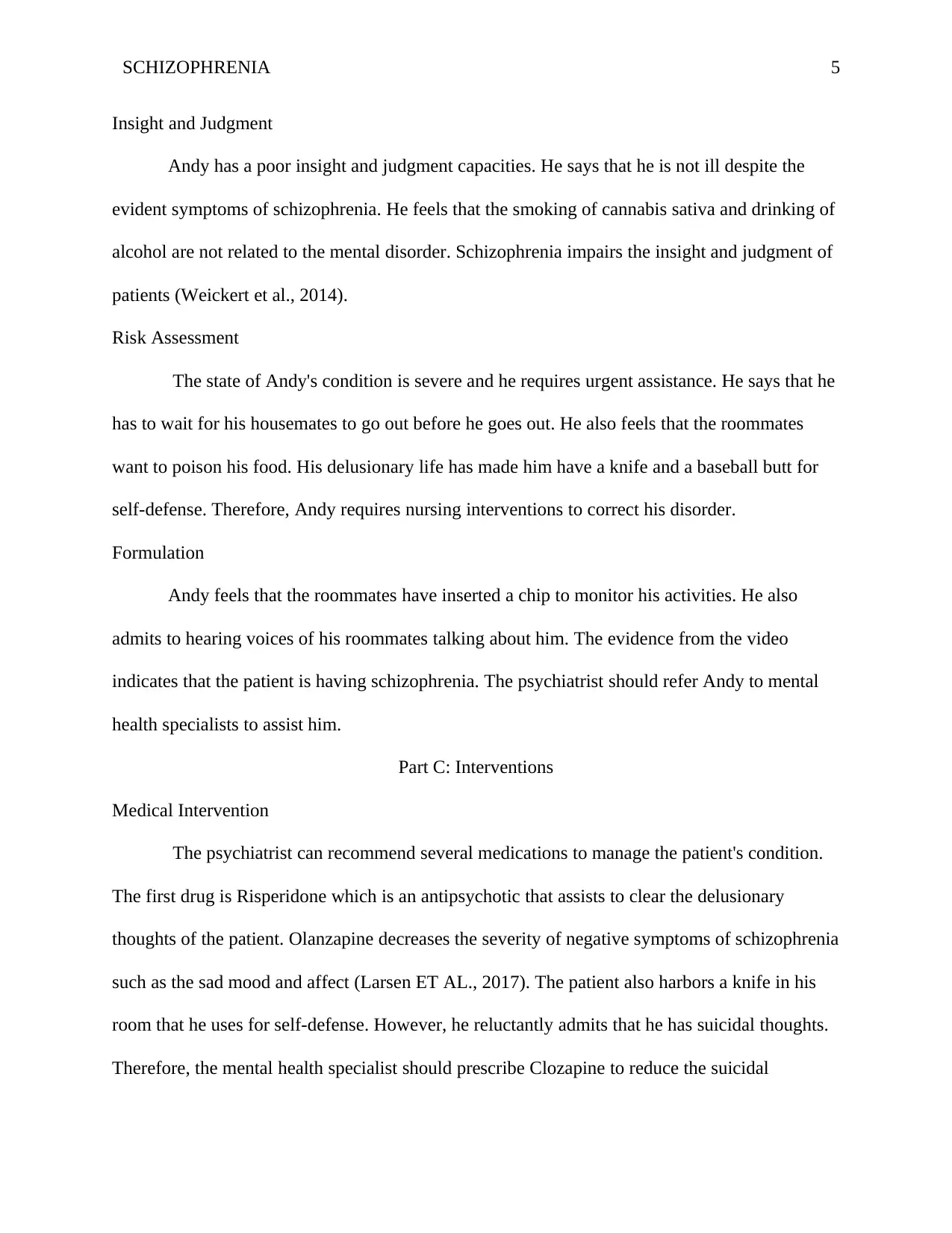
SCHIZOPHRENIA 5
Insight and Judgment
Andy has a poor insight and judgment capacities. He says that he is not ill despite the
evident symptoms of schizophrenia. He feels that the smoking of cannabis sativa and drinking of
alcohol are not related to the mental disorder. Schizophrenia impairs the insight and judgment of
patients (Weickert et al., 2014).
Risk Assessment
The state of Andy's condition is severe and he requires urgent assistance. He says that he
has to wait for his housemates to go out before he goes out. He also feels that the roommates
want to poison his food. His delusionary life has made him have a knife and a baseball butt for
self-defense. Therefore, Andy requires nursing interventions to correct his disorder.
Formulation
Andy feels that the roommates have inserted a chip to monitor his activities. He also
admits to hearing voices of his roommates talking about him. The evidence from the video
indicates that the patient is having schizophrenia. The psychiatrist should refer Andy to mental
health specialists to assist him.
Part C: Interventions
Medical Intervention
The psychiatrist can recommend several medications to manage the patient's condition.
The first drug is Risperidone which is an antipsychotic that assists to clear the delusionary
thoughts of the patient. Olanzapine decreases the severity of negative symptoms of schizophrenia
such as the sad mood and affect (Larsen ET AL., 2017). The patient also harbors a knife in his
room that he uses for self-defense. However, he reluctantly admits that he has suicidal thoughts.
Therefore, the mental health specialist should prescribe Clozapine to reduce the suicidal
Insight and Judgment
Andy has a poor insight and judgment capacities. He says that he is not ill despite the
evident symptoms of schizophrenia. He feels that the smoking of cannabis sativa and drinking of
alcohol are not related to the mental disorder. Schizophrenia impairs the insight and judgment of
patients (Weickert et al., 2014).
Risk Assessment
The state of Andy's condition is severe and he requires urgent assistance. He says that he
has to wait for his housemates to go out before he goes out. He also feels that the roommates
want to poison his food. His delusionary life has made him have a knife and a baseball butt for
self-defense. Therefore, Andy requires nursing interventions to correct his disorder.
Formulation
Andy feels that the roommates have inserted a chip to monitor his activities. He also
admits to hearing voices of his roommates talking about him. The evidence from the video
indicates that the patient is having schizophrenia. The psychiatrist should refer Andy to mental
health specialists to assist him.
Part C: Interventions
Medical Intervention
The psychiatrist can recommend several medications to manage the patient's condition.
The first drug is Risperidone which is an antipsychotic that assists to clear the delusionary
thoughts of the patient. Olanzapine decreases the severity of negative symptoms of schizophrenia
such as the sad mood and affect (Larsen ET AL., 2017). The patient also harbors a knife in his
room that he uses for self-defense. However, he reluctantly admits that he has suicidal thoughts.
Therefore, the mental health specialist should prescribe Clozapine to reduce the suicidal
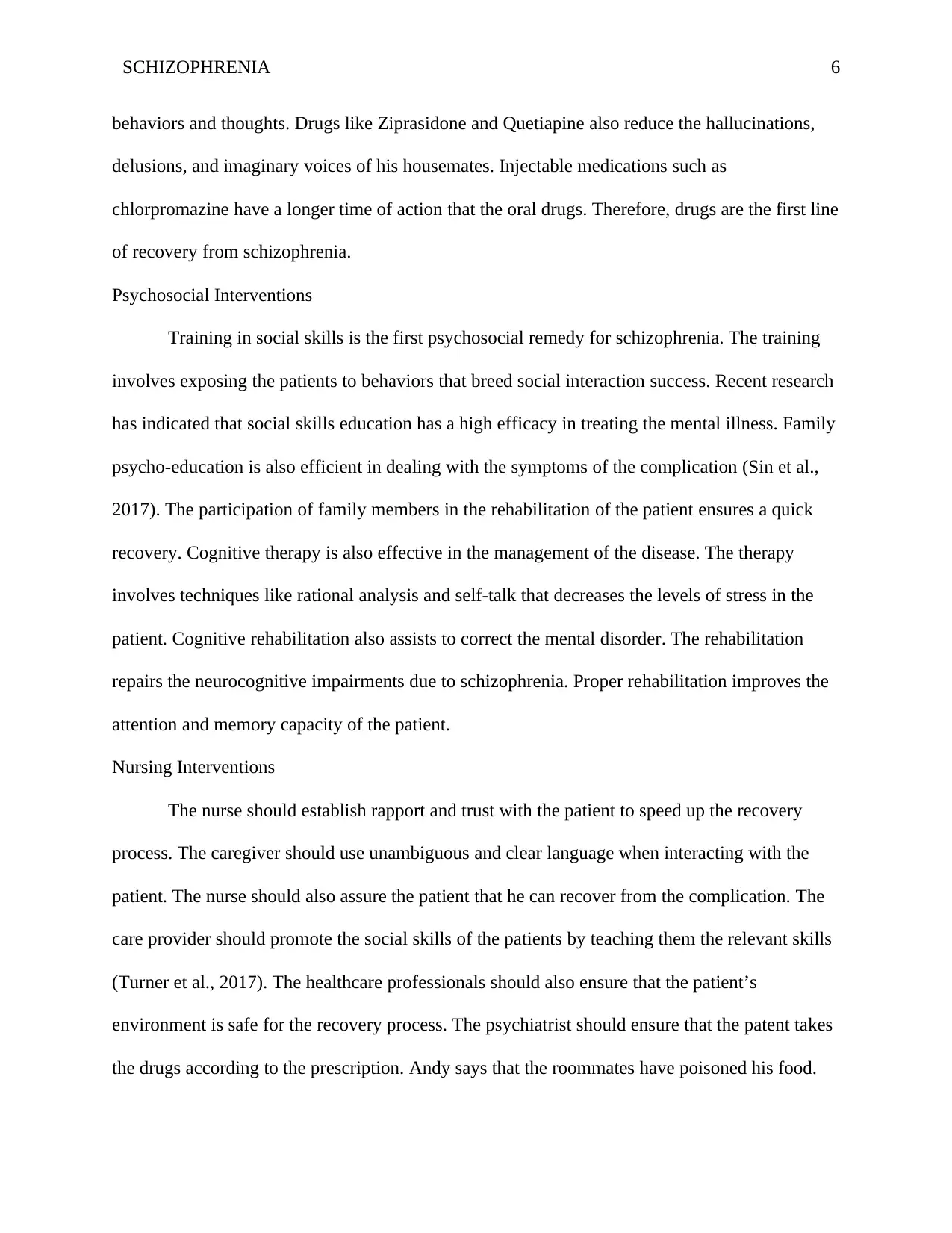
SCHIZOPHRENIA 6
behaviors and thoughts. Drugs like Ziprasidone and Quetiapine also reduce the hallucinations,
delusions, and imaginary voices of his housemates. Injectable medications such as
chlorpromazine have a longer time of action that the oral drugs. Therefore, drugs are the first line
of recovery from schizophrenia.
Psychosocial Interventions
Training in social skills is the first psychosocial remedy for schizophrenia. The training
involves exposing the patients to behaviors that breed social interaction success. Recent research
has indicated that social skills education has a high efficacy in treating the mental illness. Family
psycho-education is also efficient in dealing with the symptoms of the complication (Sin et al.,
2017). The participation of family members in the rehabilitation of the patient ensures a quick
recovery. Cognitive therapy is also effective in the management of the disease. The therapy
involves techniques like rational analysis and self-talk that decreases the levels of stress in the
patient. Cognitive rehabilitation also assists to correct the mental disorder. The rehabilitation
repairs the neurocognitive impairments due to schizophrenia. Proper rehabilitation improves the
attention and memory capacity of the patient.
Nursing Interventions
The nurse should establish rapport and trust with the patient to speed up the recovery
process. The caregiver should use unambiguous and clear language when interacting with the
patient. The nurse should also assure the patient that he can recover from the complication. The
care provider should promote the social skills of the patients by teaching them the relevant skills
(Turner et al., 2017). The healthcare professionals should also ensure that the patient’s
environment is safe for the recovery process. The psychiatrist should ensure that the patent takes
the drugs according to the prescription. Andy says that the roommates have poisoned his food.
behaviors and thoughts. Drugs like Ziprasidone and Quetiapine also reduce the hallucinations,
delusions, and imaginary voices of his housemates. Injectable medications such as
chlorpromazine have a longer time of action that the oral drugs. Therefore, drugs are the first line
of recovery from schizophrenia.
Psychosocial Interventions
Training in social skills is the first psychosocial remedy for schizophrenia. The training
involves exposing the patients to behaviors that breed social interaction success. Recent research
has indicated that social skills education has a high efficacy in treating the mental illness. Family
psycho-education is also efficient in dealing with the symptoms of the complication (Sin et al.,
2017). The participation of family members in the rehabilitation of the patient ensures a quick
recovery. Cognitive therapy is also effective in the management of the disease. The therapy
involves techniques like rational analysis and self-talk that decreases the levels of stress in the
patient. Cognitive rehabilitation also assists to correct the mental disorder. The rehabilitation
repairs the neurocognitive impairments due to schizophrenia. Proper rehabilitation improves the
attention and memory capacity of the patient.
Nursing Interventions
The nurse should establish rapport and trust with the patient to speed up the recovery
process. The caregiver should use unambiguous and clear language when interacting with the
patient. The nurse should also assure the patient that he can recover from the complication. The
care provider should promote the social skills of the patients by teaching them the relevant skills
(Turner et al., 2017). The healthcare professionals should also ensure that the patient’s
environment is safe for the recovery process. The psychiatrist should ensure that the patent takes
the drugs according to the prescription. Andy says that the roommates have poisoned his food.
⊘ This is a preview!⊘
Do you want full access?
Subscribe today to unlock all pages.

Trusted by 1+ million students worldwide
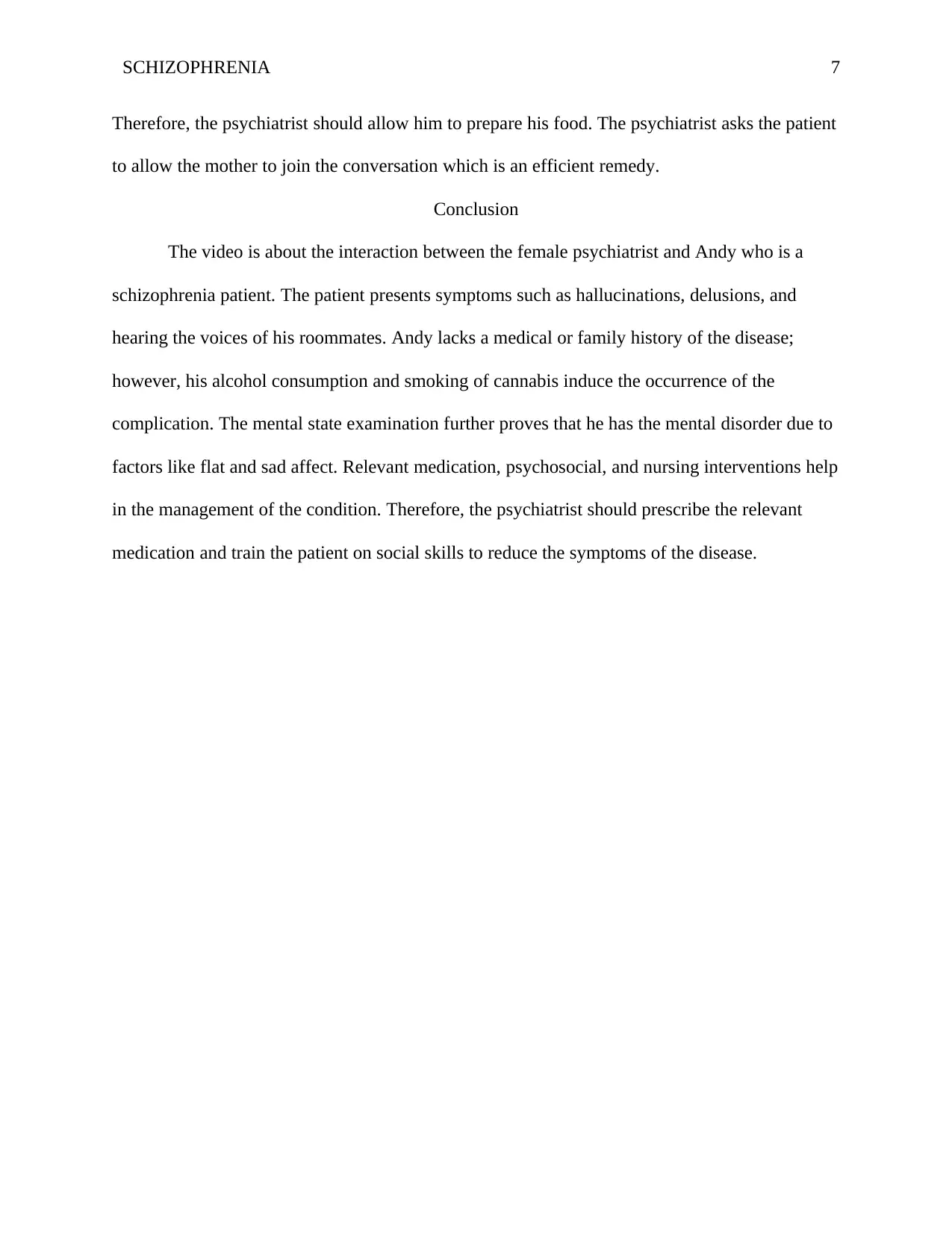
SCHIZOPHRENIA 7
Therefore, the psychiatrist should allow him to prepare his food. The psychiatrist asks the patient
to allow the mother to join the conversation which is an efficient remedy.
Conclusion
The video is about the interaction between the female psychiatrist and Andy who is a
schizophrenia patient. The patient presents symptoms such as hallucinations, delusions, and
hearing the voices of his roommates. Andy lacks a medical or family history of the disease;
however, his alcohol consumption and smoking of cannabis induce the occurrence of the
complication. The mental state examination further proves that he has the mental disorder due to
factors like flat and sad affect. Relevant medication, psychosocial, and nursing interventions help
in the management of the condition. Therefore, the psychiatrist should prescribe the relevant
medication and train the patient on social skills to reduce the symptoms of the disease.
Therefore, the psychiatrist should allow him to prepare his food. The psychiatrist asks the patient
to allow the mother to join the conversation which is an efficient remedy.
Conclusion
The video is about the interaction between the female psychiatrist and Andy who is a
schizophrenia patient. The patient presents symptoms such as hallucinations, delusions, and
hearing the voices of his roommates. Andy lacks a medical or family history of the disease;
however, his alcohol consumption and smoking of cannabis induce the occurrence of the
complication. The mental state examination further proves that he has the mental disorder due to
factors like flat and sad affect. Relevant medication, psychosocial, and nursing interventions help
in the management of the condition. Therefore, the psychiatrist should prescribe the relevant
medication and train the patient on social skills to reduce the symptoms of the disease.
Paraphrase This Document
Need a fresh take? Get an instant paraphrase of this document with our AI Paraphraser
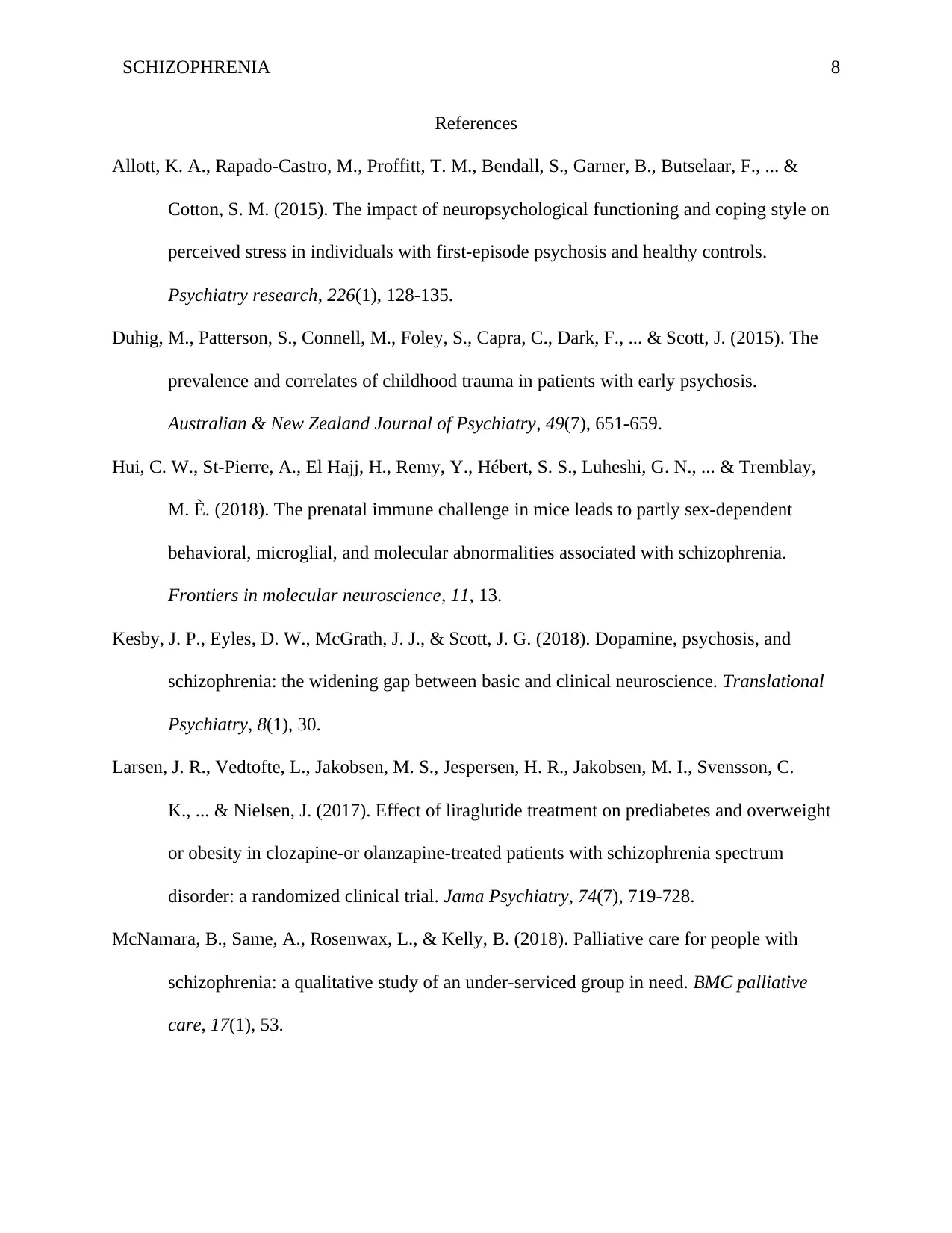
SCHIZOPHRENIA 8
References
Allott, K. A., Rapado-Castro, M., Proffitt, T. M., Bendall, S., Garner, B., Butselaar, F., ... &
Cotton, S. M. (2015). The impact of neuropsychological functioning and coping style on
perceived stress in individuals with first-episode psychosis and healthy controls.
Psychiatry research, 226(1), 128-135.
Duhig, M., Patterson, S., Connell, M., Foley, S., Capra, C., Dark, F., ... & Scott, J. (2015). The
prevalence and correlates of childhood trauma in patients with early psychosis.
Australian & New Zealand Journal of Psychiatry, 49(7), 651-659.
Hui, C. W., St-Pierre, A., El Hajj, H., Remy, Y., Hébert, S. S., Luheshi, G. N., ... & Tremblay,
M. È. (2018). The prenatal immune challenge in mice leads to partly sex-dependent
behavioral, microglial, and molecular abnormalities associated with schizophrenia.
Frontiers in molecular neuroscience, 11, 13.
Kesby, J. P., Eyles, D. W., McGrath, J. J., & Scott, J. G. (2018). Dopamine, psychosis, and
schizophrenia: the widening gap between basic and clinical neuroscience. Translational
Psychiatry, 8(1), 30.
Larsen, J. R., Vedtofte, L., Jakobsen, M. S., Jespersen, H. R., Jakobsen, M. I., Svensson, C.
K., ... & Nielsen, J. (2017). Effect of liraglutide treatment on prediabetes and overweight
or obesity in clozapine-or olanzapine-treated patients with schizophrenia spectrum
disorder: a randomized clinical trial. Jama Psychiatry, 74(7), 719-728.
McNamara, B., Same, A., Rosenwax, L., & Kelly, B. (2018). Palliative care for people with
schizophrenia: a qualitative study of an under-serviced group in need. BMC palliative
care, 17(1), 53.
References
Allott, K. A., Rapado-Castro, M., Proffitt, T. M., Bendall, S., Garner, B., Butselaar, F., ... &
Cotton, S. M. (2015). The impact of neuropsychological functioning and coping style on
perceived stress in individuals with first-episode psychosis and healthy controls.
Psychiatry research, 226(1), 128-135.
Duhig, M., Patterson, S., Connell, M., Foley, S., Capra, C., Dark, F., ... & Scott, J. (2015). The
prevalence and correlates of childhood trauma in patients with early psychosis.
Australian & New Zealand Journal of Psychiatry, 49(7), 651-659.
Hui, C. W., St-Pierre, A., El Hajj, H., Remy, Y., Hébert, S. S., Luheshi, G. N., ... & Tremblay,
M. È. (2018). The prenatal immune challenge in mice leads to partly sex-dependent
behavioral, microglial, and molecular abnormalities associated with schizophrenia.
Frontiers in molecular neuroscience, 11, 13.
Kesby, J. P., Eyles, D. W., McGrath, J. J., & Scott, J. G. (2018). Dopamine, psychosis, and
schizophrenia: the widening gap between basic and clinical neuroscience. Translational
Psychiatry, 8(1), 30.
Larsen, J. R., Vedtofte, L., Jakobsen, M. S., Jespersen, H. R., Jakobsen, M. I., Svensson, C.
K., ... & Nielsen, J. (2017). Effect of liraglutide treatment on prediabetes and overweight
or obesity in clozapine-or olanzapine-treated patients with schizophrenia spectrum
disorder: a randomized clinical trial. Jama Psychiatry, 74(7), 719-728.
McNamara, B., Same, A., Rosenwax, L., & Kelly, B. (2018). Palliative care for people with
schizophrenia: a qualitative study of an under-serviced group in need. BMC palliative
care, 17(1), 53.
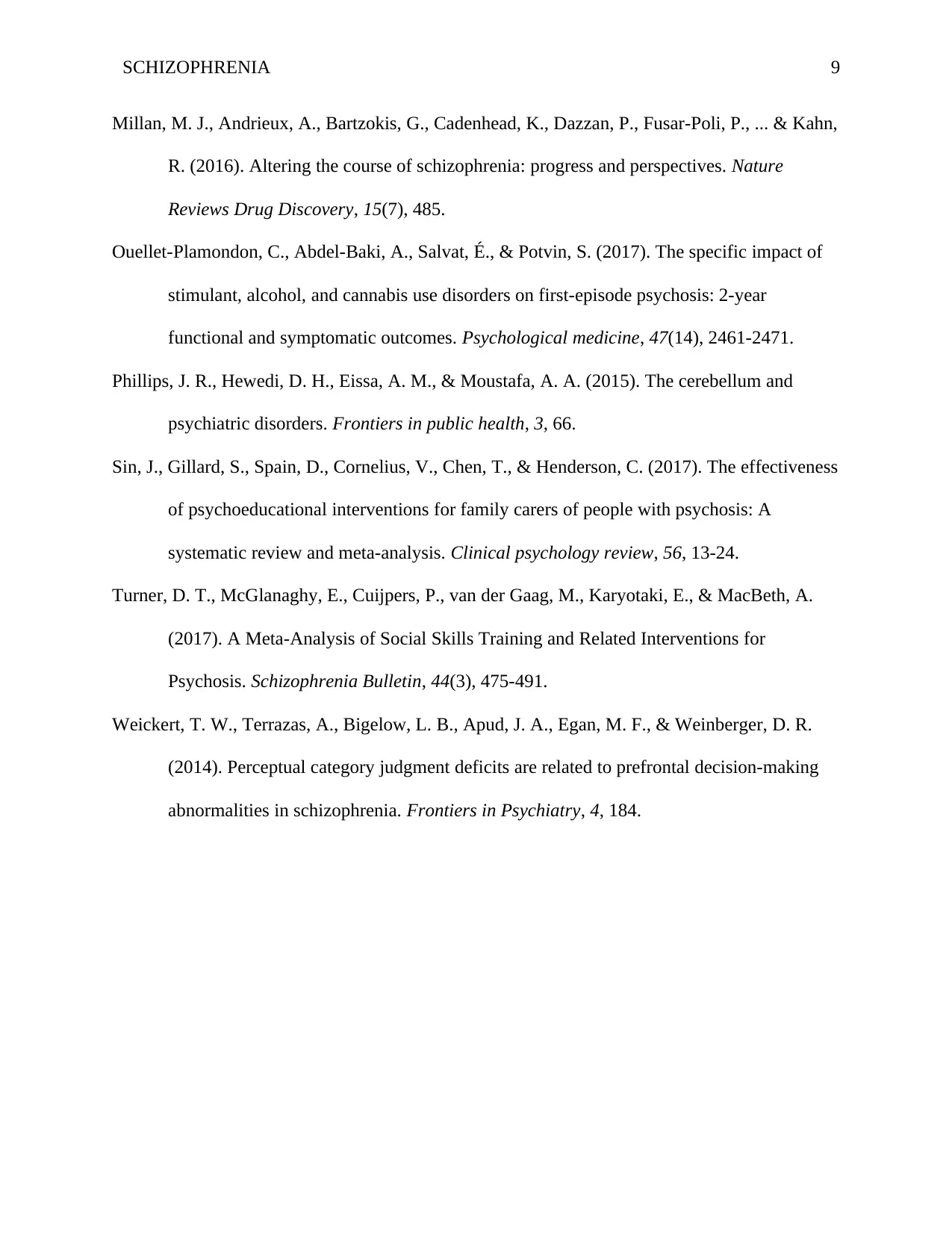
SCHIZOPHRENIA 9
Millan, M. J., Andrieux, A., Bartzokis, G., Cadenhead, K., Dazzan, P., Fusar-Poli, P., ... & Kahn,
R. (2016). Altering the course of schizophrenia: progress and perspectives. Nature
Reviews Drug Discovery, 15(7), 485.
Ouellet-Plamondon, C., Abdel-Baki, A., Salvat, É., & Potvin, S. (2017). The specific impact of
stimulant, alcohol, and cannabis use disorders on first-episode psychosis: 2-year
functional and symptomatic outcomes. Psychological medicine, 47(14), 2461-2471.
Phillips, J. R., Hewedi, D. H., Eissa, A. M., & Moustafa, A. A. (2015). The cerebellum and
psychiatric disorders. Frontiers in public health, 3, 66.
Sin, J., Gillard, S., Spain, D., Cornelius, V., Chen, T., & Henderson, C. (2017). The effectiveness
of psychoeducational interventions for family carers of people with psychosis: A
systematic review and meta-analysis. Clinical psychology review, 56, 13-24.
Turner, D. T., McGlanaghy, E., Cuijpers, P., van der Gaag, M., Karyotaki, E., & MacBeth, A.
(2017). A Meta-Analysis of Social Skills Training and Related Interventions for
Psychosis. Schizophrenia Bulletin, 44(3), 475-491.
Weickert, T. W., Terrazas, A., Bigelow, L. B., Apud, J. A., Egan, M. F., & Weinberger, D. R.
(2014). Perceptual category judgment deficits are related to prefrontal decision-making
abnormalities in schizophrenia. Frontiers in Psychiatry, 4, 184.
Millan, M. J., Andrieux, A., Bartzokis, G., Cadenhead, K., Dazzan, P., Fusar-Poli, P., ... & Kahn,
R. (2016). Altering the course of schizophrenia: progress and perspectives. Nature
Reviews Drug Discovery, 15(7), 485.
Ouellet-Plamondon, C., Abdel-Baki, A., Salvat, É., & Potvin, S. (2017). The specific impact of
stimulant, alcohol, and cannabis use disorders on first-episode psychosis: 2-year
functional and symptomatic outcomes. Psychological medicine, 47(14), 2461-2471.
Phillips, J. R., Hewedi, D. H., Eissa, A. M., & Moustafa, A. A. (2015). The cerebellum and
psychiatric disorders. Frontiers in public health, 3, 66.
Sin, J., Gillard, S., Spain, D., Cornelius, V., Chen, T., & Henderson, C. (2017). The effectiveness
of psychoeducational interventions for family carers of people with psychosis: A
systematic review and meta-analysis. Clinical psychology review, 56, 13-24.
Turner, D. T., McGlanaghy, E., Cuijpers, P., van der Gaag, M., Karyotaki, E., & MacBeth, A.
(2017). A Meta-Analysis of Social Skills Training and Related Interventions for
Psychosis. Schizophrenia Bulletin, 44(3), 475-491.
Weickert, T. W., Terrazas, A., Bigelow, L. B., Apud, J. A., Egan, M. F., & Weinberger, D. R.
(2014). Perceptual category judgment deficits are related to prefrontal decision-making
abnormalities in schizophrenia. Frontiers in Psychiatry, 4, 184.
⊘ This is a preview!⊘
Do you want full access?
Subscribe today to unlock all pages.

Trusted by 1+ million students worldwide

SCHIZOPHRENIA 10
1 out of 10
Related Documents
Your All-in-One AI-Powered Toolkit for Academic Success.
+13062052269
info@desklib.com
Available 24*7 on WhatsApp / Email
![[object Object]](/_next/static/media/star-bottom.7253800d.svg)
Unlock your academic potential
Copyright © 2020–2026 A2Z Services. All Rights Reserved. Developed and managed by ZUCOL.





